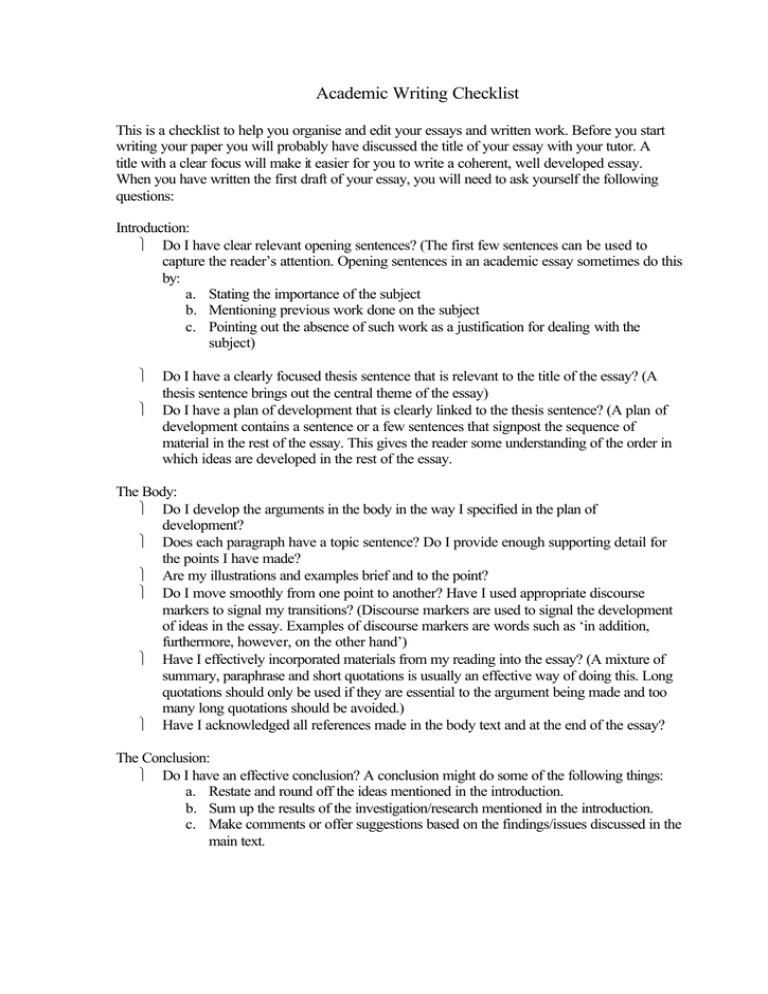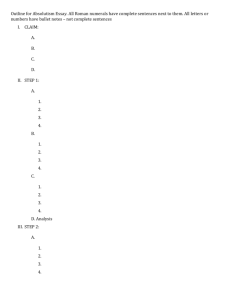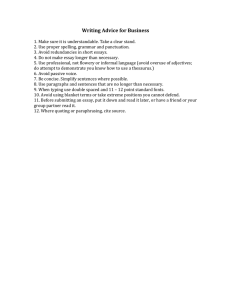Academic Writing Checklist
advertisement

Academic Writing Checklist This is a checklist to help you organise and edit your essays and written work. Before you start writing your paper you will probably have discussed the title of your essay with your tutor. A title with a clear focus will make it easier for you to write a coherent, well developed essay. When you have written the first draft of your essay, you will need to ask yourself the following questions: Introduction: Do I have clear relevant opening sentences? (The first few sentences can be used to capture the reader’s attention. Opening sentences in an academic essay sometimes do this by: a. Stating the importance of the subject b. Mentioning previous work done on the subject c. Pointing out the absence of such work as a justification for dealing with the subject) Do I have a clearly focused thesis sentence that is relevant to the title of the essay? (A thesis sentence brings out the central theme of the essay) Do I have a plan of development that is clearly linked to the thesis sentence? (A plan of development contains a sentence or a few sentences that signpost the sequence of material in the rest of the essay. This gives the reader some understanding of the order in which ideas are developed in the rest of the essay. The Body: Do I develop the arguments in the body in the way I specified in the plan of development? Does each paragraph have a topic sentence? Do I provide enough supporting detail for the points I have made? Are my illustrations and examples brief and to the point? Do I move smoothly from one point to another? Have I used appropriate discourse markers to signal my transitions? (Discourse markers are used to signal the development of ideas in the essay. Examples of discourse markers are words such as ‘in addition, furthermore, however, on the other hand’) Have I effectively incorporated materials from my reading into the essay? (A mixture of summary, paraphrase and short quotations is usually an effective way of doing this. Long quotations should only be used if they are essential to the argument being made and too many long quotations should be avoided.) Have I acknowledged all references made in the body text and at the end of the essay? The Conclusion: Do I have an effective conclusion? A conclusion might do some of the following things: a. Restate and round off the ideas mentioned in the introduction. b. Sum up the results of the investigation/research mentioned in the introduction. c. Make comments or offer suggestions based on the findings/issues discussed in the main text. Grammar and Editing: Have I used correct tenses in the essay? (the present tense is usually used to mention opinions and ideas from other research) Do I have problems with the agreement of verbs with the subject? Have I used clause structures correctly? (‘although’ and ‘but’ are not used together in the same sentence.) Have I considered if my vocabulary is as academic and precise as possible? Have I considered carefully my choice of: a. nouns b. pronouns c. adjectives ( academic writing tends to be rather formal and usually avoids informal adjectives such as ‘nice’ and ‘fantastic’ for example.) d. adverbs (in order to be precise, academic writing tends to avoid overgeneralisations and often uses adverbs such as ‘often, usually, rarely etc. to express caution about the statements being made.) e. verbs (academic writing usually avoids informal phrasal verbs and often uses rather formal Latinate verbs.) f. possible synonyms. g. Sentences (balance between long and short sentences/balance between simple and complex sentences?) Have I proofread the entire essay to make sure there are no typing and spelling errors? Have I set out my references in an appropriate format? (There are different conventions for referencing that can be used. It is useful to discuss with your tutor what conventions are used in your area of study.





